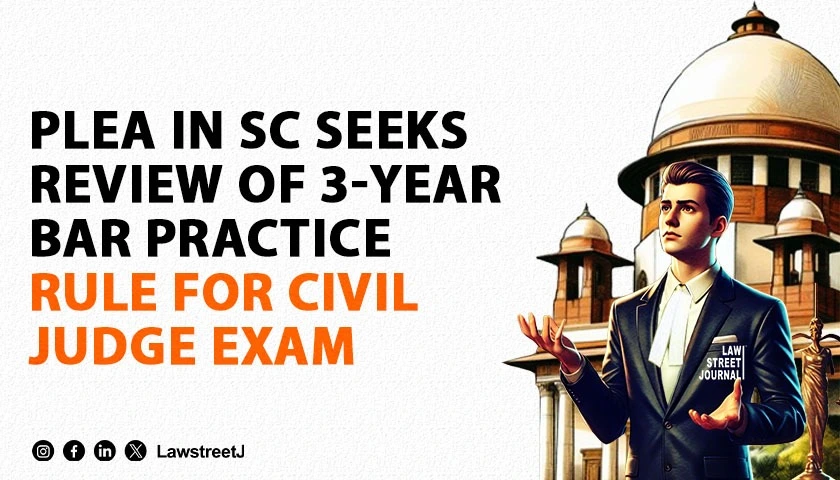NEW DELHI: A review petition has been filed in the Supreme Court against May 20, 2025 judgment prescribing a minimum three years practice at the Bar as a prerequisite for those appearing in the examination for the post of Civil Judge (Junior Division).
The mandate also unreasonably restricted the freedom of a law graduate to choose and pursue a lawful profession in the judiciary, thereby infringing Article 19(1)(g) of the Constitution, the plea filed by Chandrasen Yadav, a practising advocate and an aggrieved judicial service aspirant contended.
In its judgment, the Supreme Court had directed all the High Courts and the state governments in the country to amend the relevant service rules to the effect that candidates desirous of entering the judicial services as Civil Judge (Junior Division) will now have to possess three years experience as advocates.
The petitioner claimed the court ignored the submission by the States of Nagaland, Tripura, and Chhattisgarh and the High Court of Punjab and Haryana, which opposed the said requirement. The court unilaterally decided to ignore the Shetty Commission report of 1999 at one go, while making it mandatory for judicial aspirants/advocates to practise for three years prior entering into judicial service at lower rung/level, it said.
"The court ought to have duly appreciated the Shetty Commission’s recommendations, which explicitly stated that if young and meritorious law graduates are imparted intensive training, it may not be necessary to prescribe three years of practice at the Bar as a precondition for entry into judicial service," the plea said.
It also contended the judgment created a blanket disqualification of an entire class of law graduates without substantiating why every law graduate without three years of practice was deemed unfit.
"The judgment, committed an error apparent on the face of the record by referring to law graduates as ‘raw graduates,’ which is a misleading characterisation," it said.
The plea stated a candidate selected for judicial service is not ‘raw,’ but one who has undergone a rigorous and multi-tiered selection process comprising a comprehensive preliminary examination, mains examination testing knowledge of substantive and procedural laws, and a final viva voce conducted by senior judges or experienced legal professionals.
"Such a structured and merit-based process is specifically designed to assess the legal acumen, aptitude, and suitability of candidates for assuming judicial office, and therefore, it is inaccurate and unjust to diminish their preparedness or capability by such terminology," the plea said.
The petitioner stated his fundamental rights under Articles 14 and 16 of the Constitution stood infringed due to the imposition of an arbitrary and unreasonable condition of mandatory three years’ practice at the Bar. He contended it adversely affecting his right to equal opportunity and fair access to public employment.
The plea filed through advocate Kunal Yadav submitted the three-year practice rule should be implemented only from year 2027 onwards to avoid unjust exclusion of recent graduates (2023–2025) who prepared under the previous eligibility criteria.
"No consideration was given to the number or success rate of fresh law graduates who have historically performed well in judicial services and have served effectively on the bench after undergoing training. In the absence of such material, the judgment falls foul of the constitutional requirement that classification must be based on intelligible differentia with a rational nexus to the object sought to be achieved," the plea said.
It further contended the direction to amend service rules uniformly across all States and High Courts amounts to encroachment upon the powers of State Legislatures and Public Service Commissions, which are constitutionally empowered to frame service rules and recruitment criteria under Article 309 and state autonomy in judicial recruitment.
"Recruitment rules are within the exclusive domain of the legislature or State Public Service Commissions and not the judiciary. The uniform mandate imposes blanket rules, disregarding State-specific needs and autonomy," the plea said.
The petitioner also stated the three- year requirement may discourage women, first-generation lawyers, and economically weaker candidates who may not have the means to sustain an uncertain legal practice before securing a stable judicial post.
The three-year litigation practice requirement arbitrarily excluded law graduates working in law firms, PSUs, or corporate legal roles, despite their relevant legal experience. This amounts to unreasonable classification and violates Article 14 of the Constitution, it contended.
The petitioner also stated that the direction was not backed by any empirical study or data to show that candidates with three years of practice are better judges than fresh law graduate.















